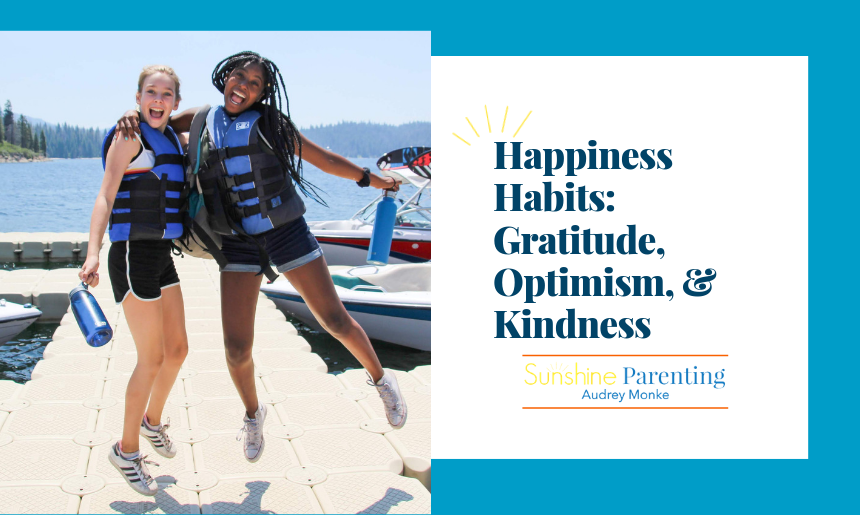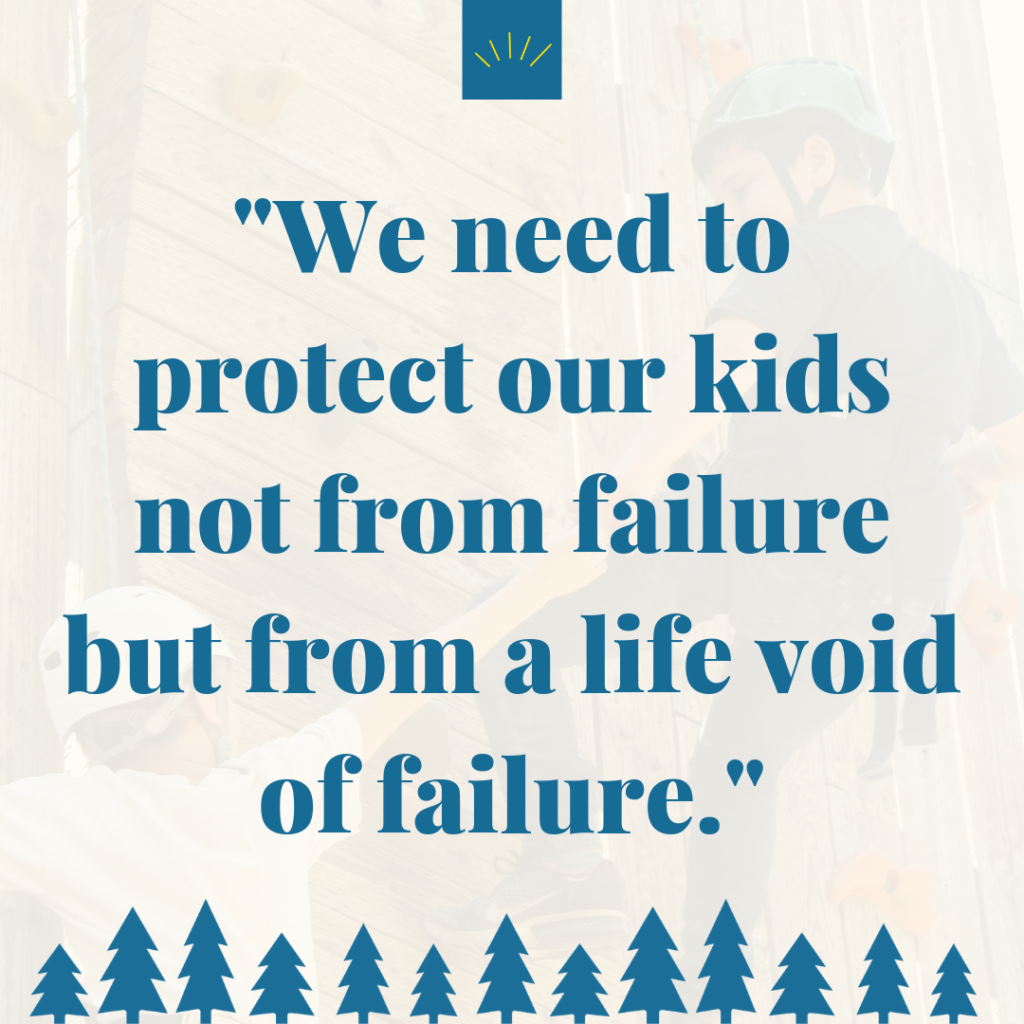
“Realize that true happiness lies within you. Waste no time and effort searching for peace and contentment and joy in the world outside. Remember that there is no happiness in having or in getting, but only in giving. Reach out. Share. Smile. Hug.”
-Og Mandino
 All of us want our children to be happy. In fact, when you ask most parents what they want for their child, they’ll often answer, “I just want him/her to be happy.”
All of us want our children to be happy. In fact, when you ask most parents what they want for their child, they’ll often answer, “I just want him/her to be happy.”
Unfortunately, being happy is not easy for many people. According to a Psychology Today article written by Peter Gray, “Rates of depression and anxiety among young people in America have been increasing steadily for the past fifty to seventy years.”
With the highest rates of depression and anxiety in history, our culture is facing an unprecedented proble m of unhappiness. At camp, we’ve seen steadily increasing numbers of campers who are being treated for depression and anxiety. A friend recommended Christine Carter’s book, Raising Happiness: 10 Simple Steps for More Joyful Kids and Happier Parents, and I enjoyed reading it and seeing how I can apply it both in my family and at camp. Many quotes in this article are from the book, and I encourage you to read it if you are interested in learning more about helping your kids be happier!
m of unhappiness. At camp, we’ve seen steadily increasing numbers of campers who are being treated for depression and anxiety. A friend recommended Christine Carter’s book, Raising Happiness: 10 Simple Steps for More Joyful Kids and Happier Parents, and I enjoyed reading it and seeing how I can apply it both in my family and at camp. Many quotes in this article are from the book, and I encourage you to read it if you are interested in learning more about helping your kids be happier!
“Our happiness depends in part on the happiness of the people we are connected with.”
-From Raising Happiness by Dr. Christine Carter
Kids love coming to camp, and, for many returning campers, camp is often described as their “happy place.”
Why is that? I think it’s because people smile here. We have fun. We sing. We dance. We laugh. We get lots of exercise, and the beneficial endorphins created from our exertion improve our moods. We don’t have homework or the distractions of constant texts, calls, and beeps. The people who work here want to be here and are “in the moment” with campers. Because camp is such a happy place, it’s easy for kids to be happy while they’re here. They relax. They let go of stress. They have fun!
But we’d like our campers to take home more than just memories of fun and happiness. So, at camp, we focus on three “happiness habits” that we hope campers will use outside of camp: gratitude, optimism, and kindness. We’re hoping campers will capture the fun and happiness of camp and take it home with them!
“…happiness is better thought of as a collection of habits rather than a
genetically endowed trait.”
-Christine Carter
What makes people happy?
As it turns out, our genetics and life circumstances account for 60% of our happiness. Research has shown that we have control over the other 40%. We can develop habits that make us happier. We can teach our kids that they can create their own happiness.
According to Carter, Only 20% of people are truly “flourishing,” which is described as being “happy and resilient even when facing difficulty.” All of us want our children to be in that 20%. We can help them by practicing happiness habits ourselves and by coaching them to develop their own happiness habits.
The following “Happiness Habits” are a great start for us as parents to help raise happy kids:
• Gratitude
• Optimism
• Acts of kindness
Gratitude
“People who ‘practice gratitude’ feel considerably happier than those who do not; they are more joyful, enthusiastic, interested, and determined.”
-Christine Carter
When kids (and adults) feel grateful rather than entitled, they are much happier. At camp, we encourage campers to talk about things they are thankful for both at camp and at home.
At home, a great dinner or bedtime conversation can be thinking of three things we are grateful for each day. Carter also recommends a “gratitude journal.” In our family, we have a bulletin board where family members can add notes of things we are each thankful for.
Optimism
People, by nature, lean towards being optimistic or pessimistic. However, we can work towards being more optimistic by practicing positive language both in our heads and to the people around us. At camp, we teach kids to have an “I can” attitude going into new activities and challenges. We also encourage campers to see tiny achievements as success. So, if a camper does not make it to the top of the climbing wall, they are encouraged and praised for their effort and for their partial success.

“We need to protect our kids not from failure but from a life void of failure.”
-Carter
Another important aspect of optimism is seeing our mistakes and failures as learning opportunities. All of us know the stories of the multiple failures of many highly successful individuals. But, unfortunately, we’re living in a time when parents often “rescue” their children from failure rather than letting them learn from it. As a parent, one of the most difficult things we need to do is sit by and watch as our children fail at something. Allowing our children to fail gives them a great opportunity for learning and growth. We can be supportive and help them regroup and learn from the failure, so that they can do better next time.
“Knowing that it is practice rather than innate talent that makes a person successful can help kids take risks in order to rise to the top of their field – or try something new in order to find their true passion.”
-Carter
I was especially struck with Carter’s chapter about praise. She stresses the importance of using “growth mindset” praise with children. Since, in reality, it is not innate skill but rather practice, dedication, and passion that dictate who rises to the top in their field, we need to encourage our children with words that focus on their hard work and dedication, not their innate skills. In fact, studies show that children who are told repeatedly that they are “smart” are less likely to choose challenging tasks that might make them not seem smart. On the other hand, children whose success is attributed to hard work and practice are more likely to accept a more challenging task. I know, with my own kids, I have been guilty of using the “innate” type of praise, but I am going to intentionally work to focus on “growth mindset” praise in the future. Our counselors at camp also focus on this type of praise. When kids know that they can practice at something to improve, they are a lot more optimistic about working at something difficult.
Kindness
Helping others makes people happy. It feels good to share, to give, and to be kind to others. At camp, we encourage campers to do kind things for each other. We recognize “GAC Spirit” daily at our assemblies, and kindness to others is one of the key spirit elements. Each day, we announce some of the acts of kindness that went on the day before. Counselors discuss ideas with campers and encourage them to think about kindness. Why not recognize “Family Spirit” by talking about nice things your kids have done for others?
I hope the happiness habits we practice at camp will help campers be happier both in and out of camp. And, I hope you can use some of these ideas at home!
Resources/Related
Ep. 1: Raising Happiness with Christine Carter
Ep. 41: Getting Comfortable with Our Kids’ Discomfort with Christine Carter

